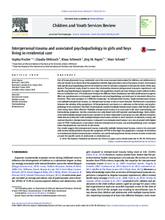Abstract
Out-of-home placement in e.g. residential care is the most common intervention for children and adolescents at risk and studies have shown that this population exhibits high prevalence rates of traumatic events. Associations with specific psychopathology need to be studied in order to sensitize caregivers to the specific needs of this population. The present study aimed to assess the relationship between interpersonal traumatic experiences and specific psychopathological symptoms in a high-risk population of girls and boys living in youth welfare institutions in residential care. 370 adolescents living in 64 different Swiss institutions and their professional caregivers filled out questionnaires on traumatic experiences and psychopathology and took part in structured clinical interviews. They were grouped in 3 different subgroups: no interpersonal trauma, single interpersonal trauma and multiple interpersonal trauma, i.e. interpersonal trauma in two or more domains. Furthermore, associations between the identity of the perpetrator (if the perpetrator was known vs. unknown to the victim) and psychopathology were examined. One third of participants reported multiple interpersonal trauma with female adolescents being more often affected. Multiple interpersonal trauma was associated with more internalizing and externalizing symptoms, but this association was only found with self-reported psychopathology. Male adolescents with multiple interpersonal trauma seemed to be more vulnerable to substance use and affective disorders, while female adolescents with multiple interpersonal trauma tended to have disorders of attention, activity and conduct disorders. Interpersonal trauma (compared to no interpersonal trauma) was not associated with higher rates of PTSD. Furthermore, associations between interpersonal trauma and psychopathology were stronger when the perpetrator was known to the victim.
Our results suggest that interpersonal trauma, especially multiple interpersonal trauma, seem to be associated with mental health problems beyond the symptoms of PTSD in this high-risk population. Concepts of residential care institutions should contain trauma-sensitive care and include psychiatric liaison services in order to take into account the specific needs of adolescents in residential care.

